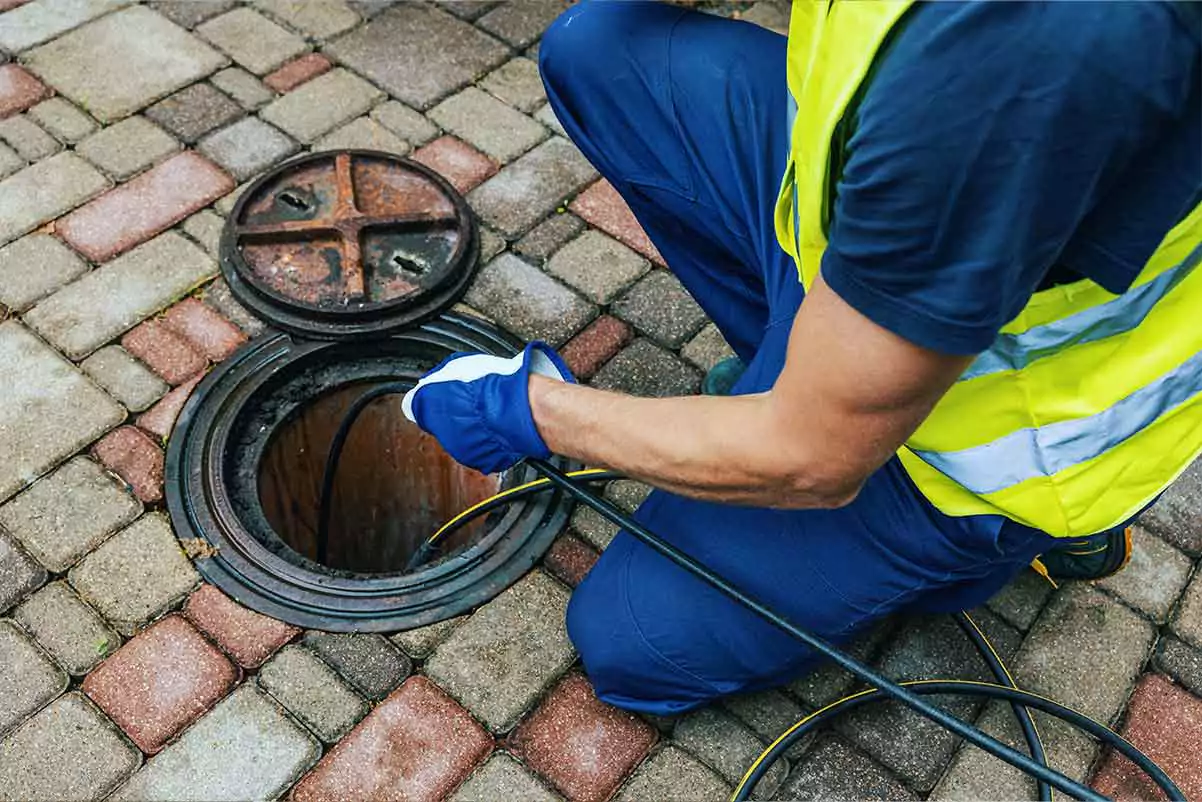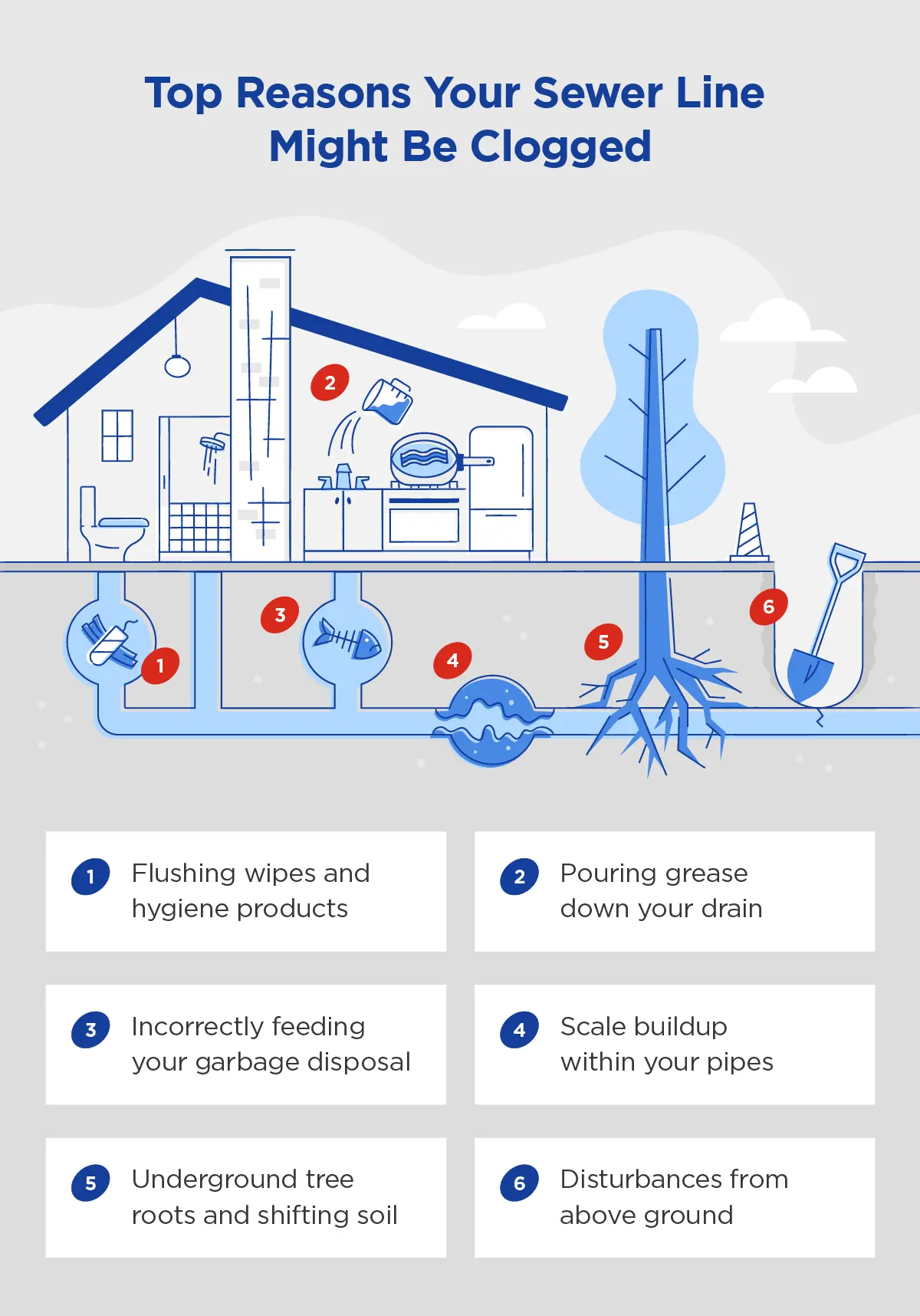
Mr. Rooter Plumbing explains how to clear a sewer line clog safely and effectively.
|
Clogged sewer lines can quickly become a plumbing emergency. They occur when discharge, such as waste and other matter, like toilet paper, can no longer pass through your sewage pipe. A blocked sewer line can cause problems such as slow drain emptying or water backing into your home.
In any case, dealing with a clogged sewer line can be a nasty occurrence. We'll explore the primary causes of sewer blockage and a few DIY fix-it tips you can try independently. In most cases, however, it's best to contact a professional like Mr. Rooter Plumbing® to handle the issue before it worsens.
Here are the most common reasons you may experience a sewage blockage:
1. Flushing Wipes and Hygiene Products
Flushing wipes and hygiene products are among the most common causes of a blocked sewage line. While toilet paper is designed to break down rapidly in water, other products are more resilient and less likely to dissolve. Instead, they become stuck in your pipes, causing a sewer drain clog.
Many hygiene products, due to their larger size, can become stuck in bends or joints in your sewage pipe. You should also avoid flushing tissues containing lotions, as the lotion can act like grease, attracting other matter and causing a blockage.
2. Incorrectly Feeding Your Garbage Disposal
Another common cause of a sewer line blockage is an improperly fed garbage disposal. When food is fed too fast into a garbage disposal or the unit cannot grind it adequately, it can cause a blockage. If you believe your appliance is malfunctioning, consider seeking a garbage disposal repair service.
Knowing what food items are safe to put into your garbage disposal is also critical. Fibrous foods, such as banana peels or corn husks, should never be put in, as they can quickly cause clogging.
3. Shifting Soil and Underground Tree Roots
A clogged sewer line is not always your fault. The shifting of soil, roots, and other underground objects can disturb your sewage pipe, causing a blockage. Tree roots in sewer lines can wreak havoc. Once inside, they can grow, causing additional cracks and openings.
Likewise, soil erosion can put pressure on your sewage system, causing breaks or stripping away protective coatings, allowing plant roots to penetrate easily.
4. Scale Buildup Within Your Pipes
Scale buildup, or limescale, is the accumulation of hard debris on surfaces that comes into contact with water (such as within your sewer line). It can seriously threaten your home's pipes, causing a clog in your main sewage line and leading to trouble.
When scale buildup occurs within your pipes, it reduces the diameter of the line. The diminished size makes it easier for debris and waste to become stuck, creating a complete clog. Older pipes are more likely to experience such issues due to their rougher surfaces; this is one reason ongoing maintenance is essential.
5. Pouring Grease Down Your Drain
Grease and oil can cause clogs and plumbing issues if poured down your kitchen sink. While oil and grease begin as liquids, they solidify as they cool, acting like glue in your pipes. This glue-like substance can catch debris and waste, causing a clog.
Grease and oil can take quite some time to advance to a threat stage, meaning the issue could surface when you least expect it. Prevent clogs and avoid pouring these materials down your drains before they become a severe problem.
6. Disturbances From Above Ground
One last way your pipes can clog (and it isn't your fault!) is from disturbances above the ground. Ongoing traffic and construction can cause pressure and vibrations, negatively affecting your pipes. If the disturbance causes a crack, you have a problem. Even small gaps can become an issue when tree roots begin to intrude.
Digging near your sewer line can also cause issues. Pipes can be damaged from direct contact, and shifting soil can lead to additional problems. Always contact your local municipality to learn about what's underground before digging.

5 Warning Signs You Have a Sewer Blockage
Waste backup is only one sign of a sewer blockage. Here are five warning signs that your pipes may be blocked.
1. Your drains are draining slowly
If you don't have a complete blockage, your drains could still be emptying, but slowly. You may have a single drain blocked, but if the issue is consistent throughout your entire home — in all your bathrooms and kitchen, for example — you likely have a more severe problem.
2. Your water appears dark in color
When sewage backs up into your pipes, it can cause stagnant water, allowing bacteria to grow. Unmoving water can also cause pipes to rust faster. Both processes can affect your water's overall color and could be a sign that something is wrong.
3. Your drains are making noises
A sewer clog can cause noise due to increased water restriction within your pipes. As water attempts to make its way past the clog, you may hear a gurgling sound. Pipes strained by blockages or air and gases trapped within can also produce knocking, popping, or vibrating noises that point to a problem.
4. Your drains have an unpleasant smell
We don't need to explain why sewage backup can cause unpleasant smells. In addition to sewage itself, stagnant water in pipes can produce microbes that create unsavory smells — not to mention a health hazard. If your drains smell funky, it might be time to call a plumber for sewer line replacement or repair services.
5. Your drains are backing up
Perhaps the worst sign that you have a clogged sewer line is when the drains throughout your home start to back up. Waste and other materials need to go somewhere; if they can't go out, they will back up into your drains. Waste backing up into your home is an undesirable experience, but more critically, it is a health hazard, and you should contact a plumber immediately.
Tips To Prevent a Blocked Sewer
A clogged sewer line can stress your family and your wallet. Rather than dealing with a sewer line blockage, follow these proactive tips to help prevent issues under your control from occurring.
- Watch what you flush: Don't dispose of flushable wipes or hygiene products in your toilet, as they may become trapped. Despite the name, flushable wipes can wreak havoc on your plumbing.
- Flush your drains yearly: To prevent clogs, flush your drains with boiling water or a 1:1 mixture of baking soda and vinegar.
- Schedule inspections every few years: Maintenance is critical to prevent clogged sewer lines; call upon a professional video camera inspection service to make sure everything is working.
- Use food strainers in your sink: This simple solution prevents excess debris from flowing down your kitchen sink and becoming stuck.
- In an emergency, call a plumber: DIY can be a great way to save a buck, but a clogged sewer line can cause health hazards. When in doubt, call a professional, such as Mr. Rooter Plumbing.
What To Do If You Have a Clogged Sewer Line
While you shouldn’t try to clear any main sewer line on your own, you might try a few DIY home remedies to rule out a clog in your smaller connecting lines before calling a plumber.
- Plunge your drains: Wherever you notice a slow drain — your toilet, your sink, or your bathtub — use a plunger to shake loose any obstructions within that line. If the high water levels and slow draining subside, your plunging may have done the trick.
- Use a plumbing snake: Slowly twist a drain snake clockwise into the drain you believe is obstructed. As you pull the snake out, twist counterclockwise. Use caution, as drain snakes can break off in your drain. If you draw out a mass of debris, you might have successfully cleared what was affecting your smaller connecting line.
- Check the vent: If an obstruction is blocking your vent pipe, pressure may prevent your drains from draining down your main sewer line. To release the pressure, carefully clear your vent (located on the roof of your home) of any obstructions using a retrieval tool, garden hose, or drain snake.
If none of these tactics is successful, it’s time to call in a professional plumber. Do not try to clear your main sewer line on your own. Even if you rent equipment, you could cause further damage to your home and risk your safety. Mr. Rooter Plumbing service professionals are trained, uniformed, and ready to deliver exceptional service and expert plumbing help.
Remember, all Mr. Rooter Plumbing services are backed by the Neighborly Done Right Promise™ — the job isn’t done until it’s done right.
FAQs
A clogged sewer line may leave you with a few questions. Here are the most common questions we receive about clogged sewer lines.
How long does it take to clear a clogged sewer line?
Clearing a clogged sewer line can take an hour to a few hours, depending on the blockage. If your lines are severely blocked, a video inspection and more advanced techniques may be necessary to find and address the clog.
How do I unclog my main sewer line?
We don't recommend you clear your main sewer line. Clearing a sewer line is a dangerous process that should only be attempted by a professional plumber. We know the sense of accomplishment from a good DIY task, but unclogging a main sewer line isn't one of them.
How does a plumber clear a sewer line?
Plumbers clear sewer lines in various ways, depending on the particular blockage. At Mr. Rooter Plumbing, we commonly use one of the following methods for addressing clogs:
- HydroScrub® jetting: Using pressurized water jets, our team scours the line to eradicate tree roots and debris or other buildup, such as grease and pipe scaling.
- Pipe lining: We might line the pipe with a sleeve to seal it off, stopping any leakage. This prevents exterior pipe moisture from drawing in thirsty tree roots. Pipe lining is trenchless, causing less mess and with no need to dig up pipes.
- Pipe bursting: This method involves using hydraulics to break apart old sewer pipes while installing a new, seamless pipe. This is an effective way to prevent further pipe leaks.
Will Drano® unclog a sewer line?
No, Drano® is not recommended to clear a clogged sewer line. Bottle unclogging solutions are designed for minor clogs and are not strong enough to break up more extensive sewer line blockages. Additionally, they may cause damage, as their harsh chemicals can corrode pipes and lead to future issues.

